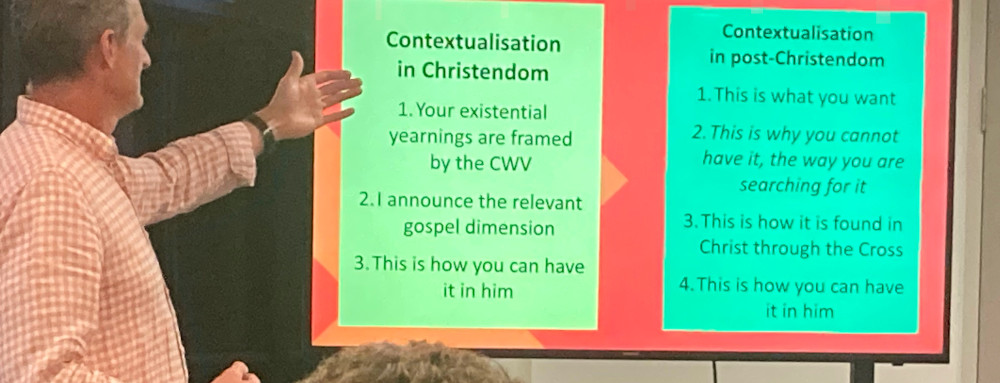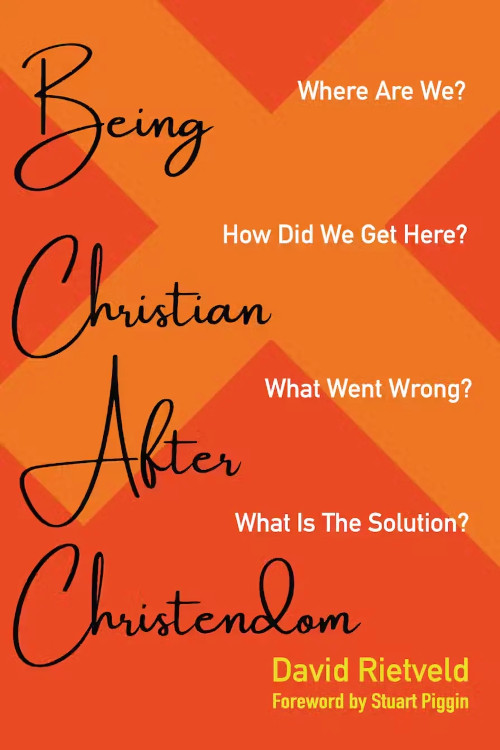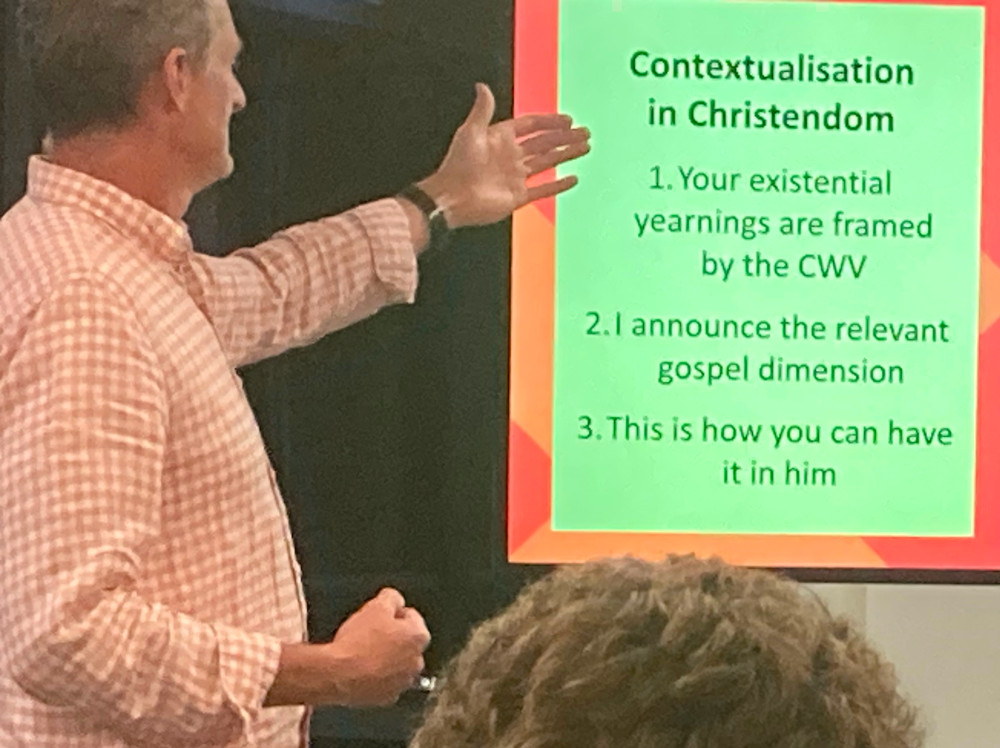Launching his book “Being Christian After Christendom” Rietveld explained that one effect of the radical change in the social landscape after the fall of Christendom – the time when Christian assumptions pervaded society – has been to make Christianity less esily understood. His book outlines how the Post Christian World View (PCWV), still in formation, developed and the better ways to talk to it.
There’s a going gap between what evangelistic tools, commonly used by Christians, assume will engage the hearer and what post-Christendom young people can take in, according to David Rietveld, an Anglican minister and author based in Wollongong.
Here’s a table that highlights our “failure to communicate.’
| WHAT IS SAID | WHAT THE WORLD LIKELY HEARS |
| God has a plan for you. | This is a power play. I am the expert on me. |
| Sin seperates | You are judgmental and hypocritical |
| Trust Jesus | Another power play. Jesus and Buddha are a resource |
| You can have eternal life | Agnostic about afterlife, focus on me now |
Some of the assumptions of a liberal progressive mindset forensically described in “Being Christian After Christendom” are present in this small table: the tendency to analyse things as power dynamics and the desire to make mankind, or oneself, the measure of all things.
“Spirituality is now self referential,” in the PCWV, Rietveld pointed out. “It’s not God, who creates a world and the normal fabric, and he’s at the beginning of history and at the end of history, drawing everyone to himself and judging. It’s now self referential. We are the author of our own story.”
It is not just people with no Christian background that struggle with how we present our message.
Rietveld tells the story of a chaplain in a Christian school, where some 70% of the students come from reformed evangelical churches, got his year nine kids to read this statement: “To experience happiness and flourishing. I need to find my true self and do whatever I think will feel inside. So long as it doesn’t restrict someone else’s freedom to express themselves. Other people and organisations that try to influence me contaminate my sense of self.” The chaplain asked the year nine’s what they though of it. “One kid said, ‘yeah, I think it’s right,’ the others grunted in agreement, and nobody objected.”
“How is it that kids in a Christian school believe that statement to be true? And the answer is, they don’t have Christendom assumptions, and they have imbibed a completely different set of assumptions.”
Here’s how Rietveld suggest we adapt to the shift in culture, and place the gospel into this culture.

Here’s how Rietveld describes how we have used the context of Christendom in gospel presentations.
- Your existential yearnings are framed by the Christian world View.
- I announce the relevant gospel dimension
- This is how you can have it in him.
In post-Christianndom Reitveld suggests it needs to be more like this.
- This is what you want
- This is why you can not have it, the way you are searching for it.
- this is how it is found through Christ on the cross.
- This is how you can have it in him.,
Rietveld says that rather than him telling people to modify the gospel – a possible criticism raised by some – he is following Paul. “The gospel is good news that everyone needs and will be saved for. Absolutely. And yet, simultaneously, and I’ve deliberately got the gospel, the bigger circle that we also see in Scripture that there are yearnings of culture. And so when Paul speaks to church in Antioch, Acts 13, these are people who are looking for someone in the line of David. And Paul has a sermon that demonstrates how Jesus is the Messiah to fulfill the aspirations and purpose. But in Acts 14 when he’s talking to Lystran farmers, he’s talking about a god who brings rain in the seasons. And in Acts 17, when he’s talking to the Athenians, he talks and quotes, not the Old Testament, but he quotes philosophers, and he’s playing off Epicureanism and Stoicism. And so Paul, is speaking to Jews looking for signs, Greeks looking for wisdom, farmers looking for rain, whatever the yearnings of culture are, focuses on that. And then thirdly, we also get the sense a Paul describes himself as someone who as a Jew to Jews, not under the law to those not under the law, weak to the weak. And so he is connecting as an evangelist with the yearnings of this particular culture.”
At one point, Rietveld gave a detailed table of what current yearnings look like. Here are couple of examples (which I have removed from the original table form to make them readable on the mobile devices most readers of this site use)
Yearning:
Thrive/flourish
Idol:
I’m the expert on me
Reality:
many not thriving
Feeling:
Dislliunsionment, lost/confused
Gospel opportunity
Plants thrive under a gardener/environment
Yearning:
Soul mates for the journey
Idol:
I thrive with friends
Reality:
Superficial relationships
Feeling:
Lonely, isolated, blaming, tired
Gospel opportunity:
Loving and serving others is the path to friendship
A full version of this table is here and well worth browsing.
As he acknowledges he draws on the work of Chris Watkin, author of another recent and significant book, Biblical Critical Theory: How the Bible’s Unfolding Story Makes Sense of Modern Life and Culture. Watkin provides an explanation of how through Christ the cultural yearning of Jews and Greeks are met.
“Jews demand signs and Greeks look for wisdom, but we preach Christ crucified: a stumbling block to Jews and foolishness to Gentiles, but to those whom God has called, both Jews and Greeks, Christ the power of God and the wisdom of God.” (I Cor 1:22-24 NIV)
As Rietveld ruefully said, his reformed Christian background suggested that Jews and Greeks were simply called to repent rather than continue to seek signs or wisdom. But when Paul goes on to say “Christ the power of God and the wisdom of God,” he is affirming that the yearnings of both cultures can be met, and are best met in Christ.
Rietveld is careful to note that older, existing gospel presentations work, still. “And so can anyone be saved by using an expression of the gospel that somehow doesn’t capture the yearnings of his cultural moment? Of course, absolutely.”
Community is key to conversions in this new world. Rietveld explains that evangelism courses that have weekends away tap into a sociological truth, “the literature says that sociologically conversion happens when 50% of the most significant people in your life, the most influential voices in your life actually believe in the new worldview.”
“When you actually are prepared to spend a weekend of your disposable time, those people move categories from associate to friends. I play soccer with non Christians. So I moved to Wollongong, I joined a pub team. I’m kind of this weird guy who’s a minister, and they don’t know what to do with me until I go on the weekend away at the end of the season. And then suddenly, the level of relationships a level.”.
Introducing “Being Christian After Christendom” at the book launch, the historian Stuart Piggin urged people to read Rietveld thoroughly. In saying that Rietvelt has handled Foucault, Derrida and Marx well, in explaining where the PCWV comes from Piggin adds “It’s not the work of a nerdy academic. It’s the work of pastor academic, [he] feels for those who are the victims of the post Christian worldview, as indeed we all are much of the time. But he also feels for us Christians who see our old certainties have lost their appeal.”

Being Christian after Christendom, David Rietveld, Wipf and Stock, 2023 $44.99
Available from Koorong
Image: David Rietveld launches Being Christian After Christendom

